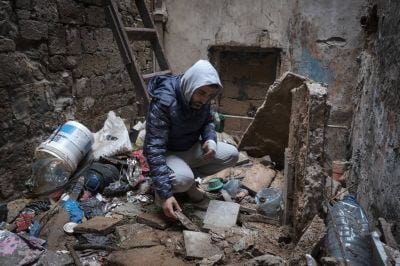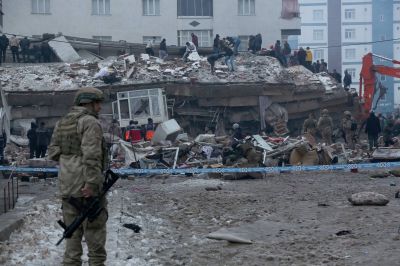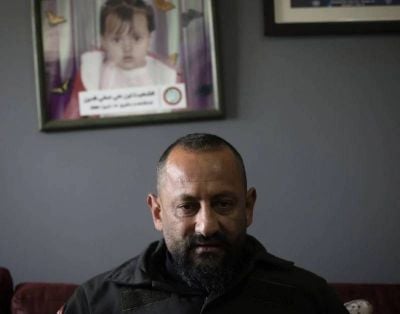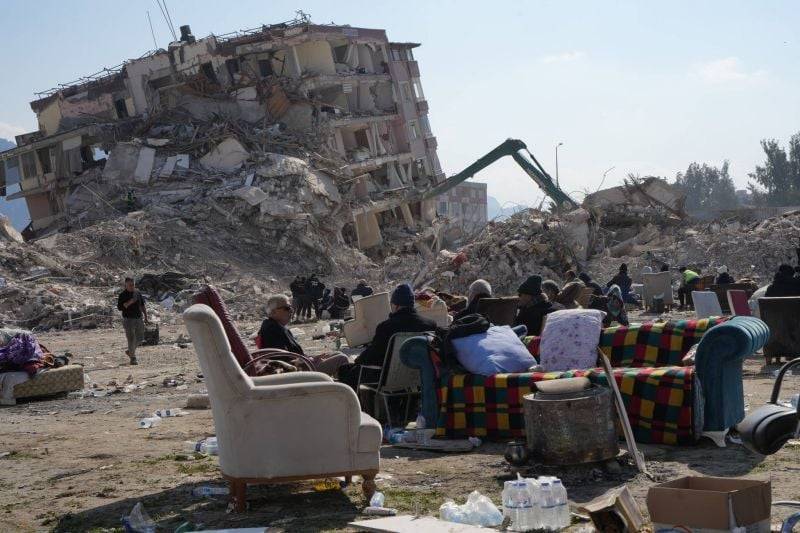
Families wait to receive news of their loved ones trapped under the rubble of a building in Antakya on Feb. 12, 2023. (Credit: Mohammad Yassin/L'Orient-Le Jour)
ANTAKYA, Turkey — It sits there on a small, filthy generator for all to see. Men come and go next to the object without paying attention to it. They are too busy following the scene below, as a rescue worker looks for a sign of life between the tiled floors of a ruined building on Rüstem Tümer Paşa Street.
On the first photo of the small laminated album, there is this young man laughing out loud, a birthday cake in his hand, surrounded by friends — a stolen moment exhumed from the rubble, like a sacred object on which one poses an indiscreet look, a little ashamed.
To walk through the residential streets of Antakya, where entire neighborhoods have been reduced to dust, is to enter the intimacy of homes without having been invited.
Collapsed homes sit like broken doll houses where you can see a child's bed, an almost intact sink or wedding pictures still hanging atop the wallpaper. When the earth rumbled while the city slept, what did the inhabitants of these apartments do? Did they survive or are they still lying under the stones?
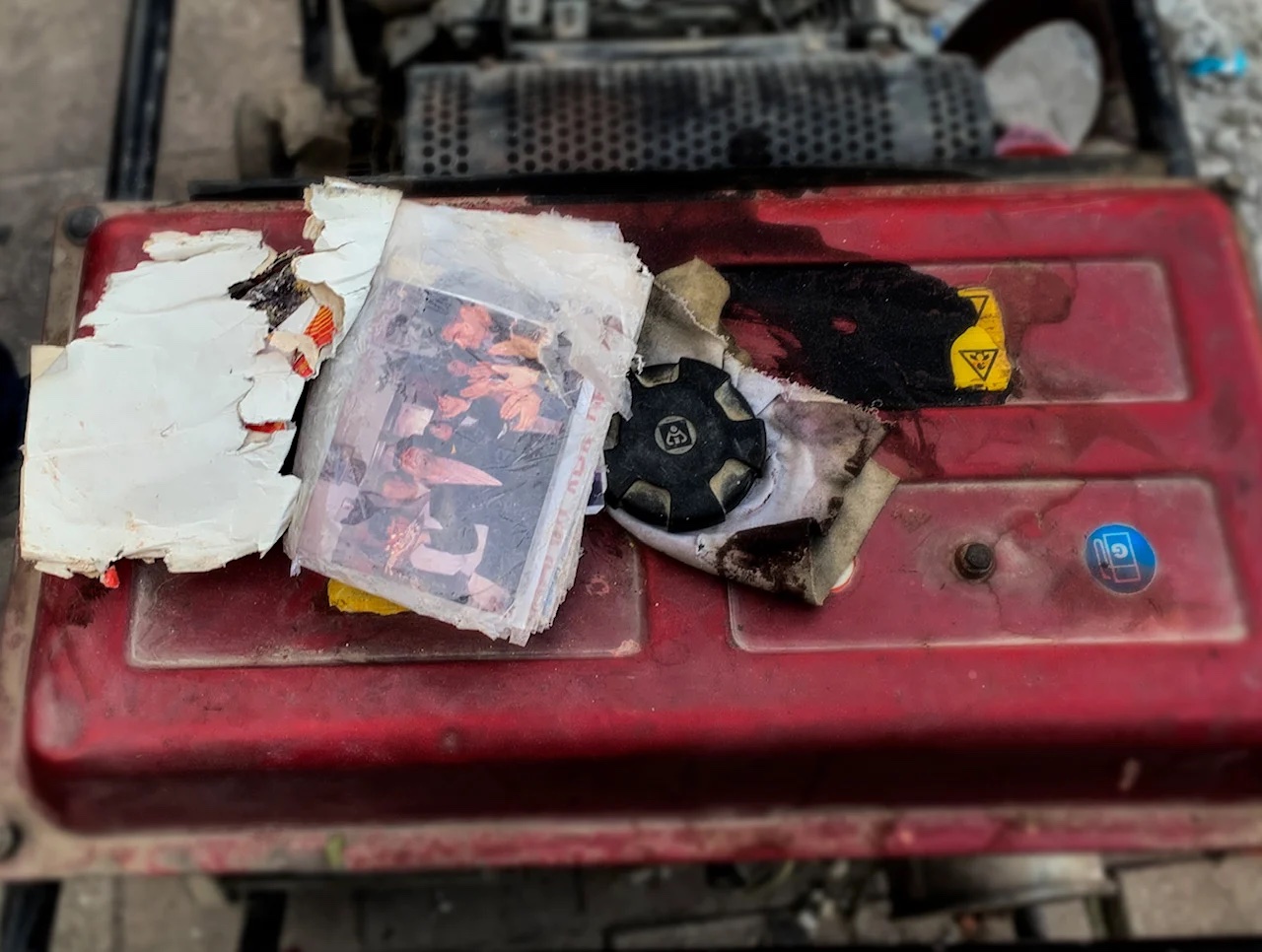 A photo album sits amid the rubble in Antakya, Feb. 12, 2023. (Credit: Caroline Hayek/L'Orient-Le Jour)
A photo album sits amid the rubble in Antakya, Feb. 12, 2023. (Credit: Caroline Hayek/L'Orient-Le Jour)
The 7.8-magnitude earthquake killed more than 43,500 people in Turkey, which is still exhuming its dead. Since then, Warda* comes every day to check the state of her apartment in Antakya’s Haraparası district. With difficulty, she climbs one by one the devastated steps to the fourth floor and leaves with valuables or souvenirs. The elderly woman hides behind her pink scarf to cry. All the neighbors are gone. Four of them did not survive. She remembers a scene from the morning after the quake that never leaves her mind. In the middle of her street, between the rubble, the rain, the mud and the hundreds of families fleeing, Warda and her husband remained frozen arm-in-arm for hours, without knowing what to do or where to go.
Five days after the disaster, the survivors like her move through the streets like automatons, looking sometimes dazed, sometimes grim. They have to save those who remain to be saved or recover the bodies of their loved ones to bury them as quickly as possible.
Neighborhood after neighborhood, a strange atmosphere takes shape outside, made of dust and the smell of death. The hysteria of the first days has given way to a chilling calm, broken only by the sound of machines turning over the rubble like they would on any building site.
"We are alive, but we are dead inside. Antakya is gone," says Warda. She speaks a broken Arabic, like many inhabitants of the city that was once part of the Syrian Mandate until it became part of Turkey in 1939.
Turks, Arabs, Kurds, Syrian refugees... For the past few decades, the oft-mythologized city has been their cocoon, a haven of coexistence with little or no conflict. Before this month’s fateful Monday, there were already few remaining traces of the glorious past and the civilizations that succeeded each other. Nature had once again taken its toll.
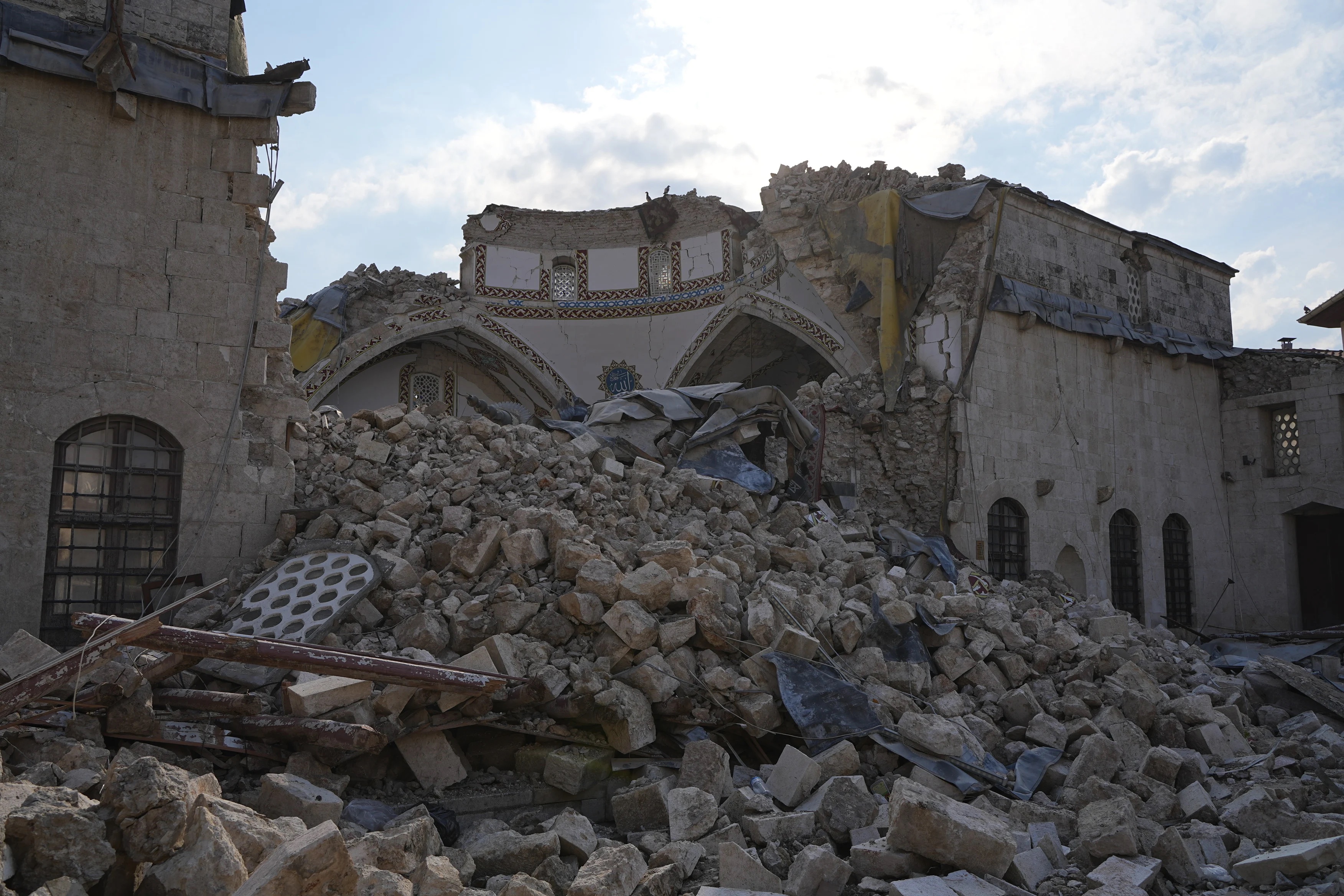 The heavily damaged Habib-i Najjar Mosque, built in the seventh century, in Antakya. February 2023. (Credit: Mohammad Yassin/L'Orient-Le Jour)
The heavily damaged Habib-i Najjar Mosque, built in the seventh century, in Antakya. February 2023. (Credit: Mohammad Yassin/L'Orient-Le Jour)
Shortly after the division of the empire at the death of Alexander the Great in the fourth century BCE, Seleucus I, one of his generals, founded the city and named it after his father, Antiochus. Capital of the Seleucid Empire, it competed with Alexandria before becoming the capital of Roman Syria. In 115 CE, a 7.5-magnitude earthquake ravaged the city and its suburbs, and then again in 526, during the Byzantine period. More recently, quakes rocked the city in 1853 and 1872. The legends that still exist from those ancient tremors point to the wrath of God.
The historic center of Antakya, dotted with collapsed hotels and restaurants, is a shadow of its former self. No one dares to venture into the maze of the old souk, which was once full of people.
Sitting on a stone, Omer* scribbles with a pencil. Facing him is the Habib-i Najjar Mosque, built in the seventh century, which makes it one of the first in the region and one of the main tourist monuments, has lost its dome and minaret.
Thinly dressed despite the cold, and with shaggy hair, Omer, an Alawite man in his 50s, says he wants to put his "memories" on paper. He whispers that he himself pulled the bodies of his cousins out of the rubble, that his house is still standing, but that he prefers to sleep in the street. Then he lowers his voice and asks for alms.
A few meters away on the square, near an almost empty pond where garbage floats, a family has practically reconstructed the interior of their house under a plastic tent. There is a stove in the center, mattresses, books on a stool that a little girl leafs through. Their small kitchenette is fairly well equipped; even bird cages hang at the entrance.
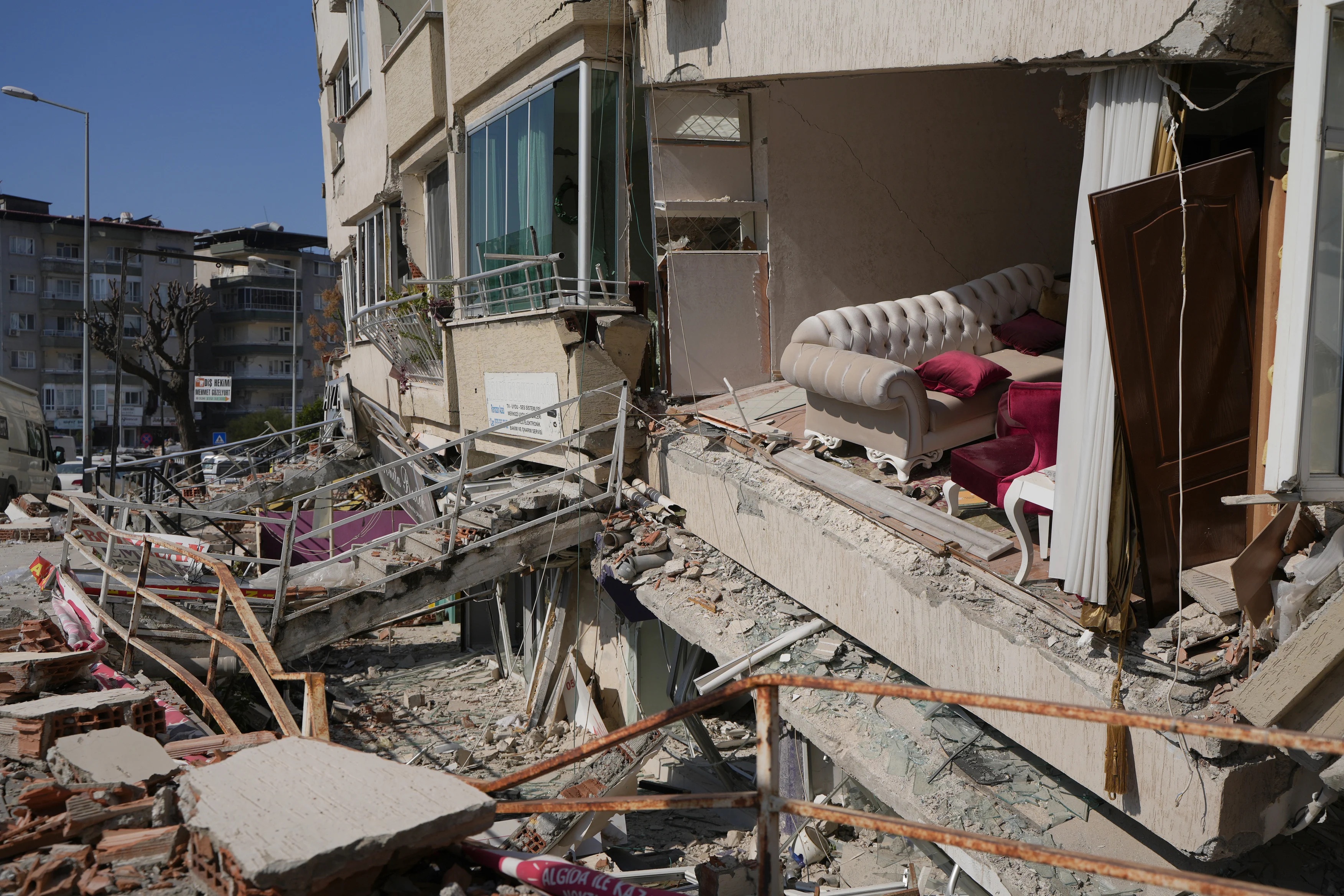 An apartment destroyed by the earthquake, Feb. 10, 2023. (Credit: Mohammad Yassin/L'Orient-Le Jour)
An apartment destroyed by the earthquake, Feb. 10, 2023. (Credit: Mohammad Yassin/L'Orient-Le Jour)
Rana*, a Damascene in her 40s, walks across the square to the entrance hall of the mosque, where she has taken refuge with her Turkish husband, daughter and nephews. Many Syrians like her who arrived shortly after the start of the war in Syria have settled in the Habib-i Najjar neighborhood, where Arabic is spoken widely and rents were cheap.
Seven days have passed since Feb. 6, and Rana has no news of her two sons, 21 and 19, who were crushed between the first two floors of their building. Every hour that passes has become a torment for this mother who does not want to talk about their "bodies" and refuses to think about "after." She clings to the stories that pop up on social networks of survivors who came out of the ground after four, five, six days, or even more.
Four buildings away, Kaan* and a team of volunteer miners have secured an area where they have been working since the morning. After arriving from Istanbul day of the earthquake, he is counting the number of bodies found at what was once 75 Assi Avenue: 52 in total.
"I still don't understand how this building collapsed. How did they build it? It's amazing," he says, referring to the building, which is new and overlooks the Orontes River (“Assi” in Arabic).
Like many other residents and rescue workers in Antakya, Kaan deplores the inaction of the authorities during the first days. Because of the chaos, equipment for excavation and rescue arrived slowly.
"There was a huge problem of coordination between organizations," says the volunteer. His voice is hoarse from shouting "kimse var mi?" (“is anyone there?”) in front of fallen concrete slabs, a phrase also spoken in Arabic that appears all over the city. At each of these moments, Antakyians, families, rescue workers, policemen, journalists freeze like wax statues, hold their breath or pray in silence for a small voice or a tap to emerge.
"I loved Antakya so much, I fell in love with it. But unfortunately, it has collapsed, its history and its present, the old and the new, to the point where people no longer believe that it can ever rise from its ashes," Kaan says.
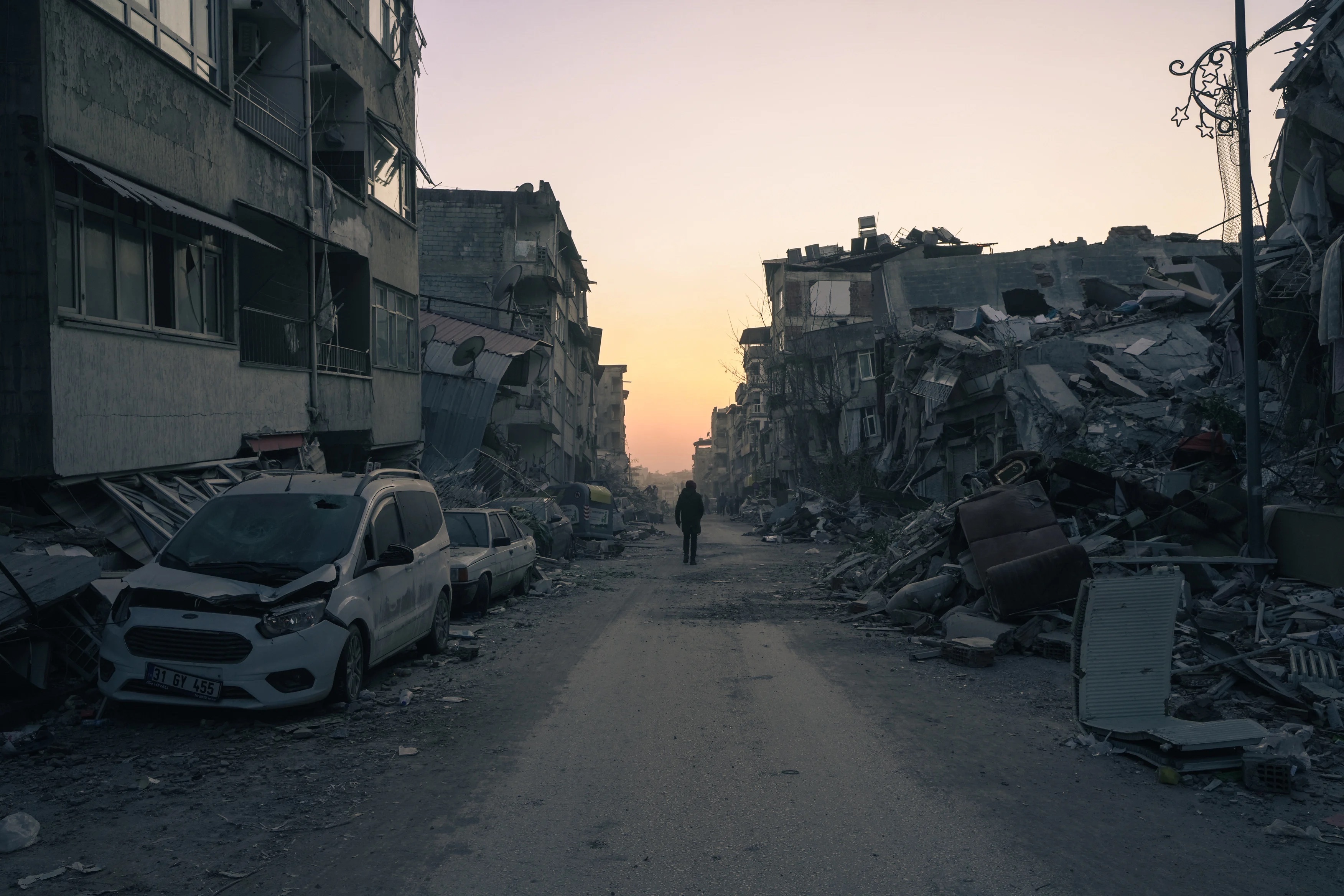 A man walks down a destroyed street in Antakya after the Feb. 6 earthquake. (Credit: Mohammad Yassin/L'Orient-Le Jour)
A man walks down a destroyed street in Antakya after the Feb. 6 earthquake. (Credit: Mohammad Yassin/L'Orient-Le Jour)
Museums, but also places of worship such as churches, synagogues and mosques testify to the past of the city, known for its religious diversity. On Kurtuluş Street, the facade of the discreet synagogue recognizable by its Star of David engraved in stone, has been relatively spared, as has the interior of the building supported by wooden beams. The eight nearly four-century-old Torahs were recovered intact in the days after the earthquake and sent to Istanbul.
The Jewish community that settled here 2,500 years ago has been reduced to just a smattering of residents, especially after many families left in 1979 during the violent political unrest in Turkey. The earthquake was the last straw for this aging community.
Of the last 16 residents, two perished: their leader, Saul Cenudioglu, and his wife Fortuna, whose bodies were pulled from between the rubble of their apartment by Israeli rescue workers. The 14 survivors found refuge elsewhere, including in Istanbul.
"This is a sad outcome of this rich chapter of the Jewish community in Antakya," laments Rabbi Mendy Chitrik, head of the Alliance of Rabbis in Islamic States. "Relations between the different religious sects have always been very warm and part of the city's identity. We will have to rebuild the buildings but also recreate this divine atmosphere," explains the rabbi.
"We will never leave here. This is where the disciples of Jesus came as mentioned in the Acts of the Apostles," says Abouna Boulos, a priest. "Our faithful are processing the shock, they have taken refuge far from here, but as soon as we can, we will return home." Boulos, a Turkish priest who had been studying in Lebanon, left for Antakya in a hurry, tasked by Patriarch John X, head of the Greek Orthodox Patriarchate of Antioch and All The East, with burying the dead.
Each day has its own set of sorrows, and Boulos no longer counts his "children" whom he accompanies to their final resting places. More than a thousand Christians from this community were still living in the city before the earthquake. About 40 died due to the earthquake, and most survivors lost their homes or businesses.
In the huge mezarlık (“cemetery”), convoys follow one another with bodies in plastic body bags in the back of pickup trucks. Men all around recite the Fatiha. Sunni sheikhs appear like spectres in the cypress-lined alleys.
Criticism of the state
The exit of the cemetery, in a square that has become an open-air morgue, smells of rotting bodies. Families weave between dozens and dozens of black and blue plastic body bags.
The identified bodies will be taken to the cemetery, while the others will be sent to what was once a vacant lot in Narlıca, a small town on the outskirts of the city. There, hundreds of mounds of earth emblazoned numbered signs mark the newly dug graves.
A week after the earthquake, a lead weight seemed to fall on the city. The authorities tightened the screws and prevented journalists from approaching areas, like burial grounds, deemed too "sensitive." Very quickly, the security forces intervened. "These are orders from above, I can't do anything. I can only tell you that the victims' fingerprints are taken before they are buried so that the families can find them one day," says a police officer, one of the few who agrees to talk.
The Turkish authorities have been strongly criticized for their management of the earthquake in this city. Nevertheless, Antakya in the hands of the Turkish president's party, the AKP, which would not want these images to give fuel to the opposition parties.
As the days go by and the chances of finding survivors diminish, the feeling of abandonment swells.
In addition to the criticism of the government by the population, rumors of theft now circulate throughout the region. The police, the army and anti-terrorism forces have deployed in several neighborhoods and are making rounds after dark. Those who are willing to talk justify their presence for "security" reasons.
"The larcenies started from the first day, it's awful, how can someone do that?" says a policeman while his superior, visibly uncomfortable, gives him a disapproving look.
It is impossible to confirm the number of people arrested since the earthquake for accusations of theft. Several people L’Orient-Le Jour met, including members of the Alawite community that makes up a big part of Antakya's population, point a finger at Syrian refugees.
Since the Syrian war began more than a decade ago and refugees started arriving in Turkey, tensions have emerged between locals and Syrians fleeing Bashar al-Assad's regime.
"They are the ones who steal, who else?" claims Ali* a resident L’Orient-Le Jour spoke with one evening the city’s Democracy Square. The area has been transformed into an impromptu aid camp.
Ali, a corpulent man with piercing green eyes, has just accompanied his uncle to his destroyed apartment to recover some cash. "I had a life of luxury. An apartment in a new building worth $300,000, a brand new living room for $20,000, businesses worth millions, poof, I lost it all in one night," he says. Ali starts whispering about Erdogan, someone who is very "unfair" and "doesn't like" Alawites like him.
A little further on in the square, Marwa and her family sit on a low wall, huddled together to keep warm. They have been sleeping there, in an adjacent tent, for seven nights.
The 27-year-old rescued her birds and her dog, an unfriendly chihuahua named Comtesse, from the apartment. "Sorry, since the earthquake she is traumatized," Marwa apologizes.
Monday, Feb. 6, was to be Marwa’s first day of work after months of unemployment. She just smiles and thanks God for having spared her and her family. She wants to leave the area because of the lack of hygiene and the epidemics that could occur "because of the dead bodies all around." But she has nowhere to go.
Night settles over Antakya, now lit only by the stars. The boulevards lined with shattered buildings look like scary movie sets, but the smell of dead bodies brings instantly back to reality.
In the middle of the long Gündüz Street, a bulldozer works on clearing concrete blocks in search of bodies. A family gathered in front of a portable heater waits silence.
About 50 meters away, two dozen people sift through the rubble in a vacant lot. A body in a bag is lying there, without it shocking anyone.
It is almost 11 p.m. and a man, perched on a crumbling building, demands silence. He launches this cry in Arabic that he repeats like an antiphon: "If someone hears me, hit the wall!"
*Some names have been changed at the interviewees' request.
This article was originally published in French in L'Orient-Le Jour.
